- Home
- Arthur Conan Doyle
The Maracot Deep Page 6
The Maracot Deep Read online
Page 6
But our speculations were interrupted by a stern voice at our elbow, and we found several men in yellow garments and high hats, who were clearly the priests of the Temple. From the expression on their faces I should judge that we were very near to being the last victims to Baal, and one of them had actually drawn a knife from his girdle. With fierce gestures and cries they drove us roughly out of their sacred shrine.
“By gosh!” cried Scanlan, “I’ll sock that duck if he keeps crowding me! Look it here, you Bindlestiff, keep your hands off my coat.”
For a moment I feared that we should have had what Scanlan called a “rough house” within the sacred precincts. However, we got the angry mechanic away without blows and regained the shelter of our room, but we could tell from the demeanour of Manda and others of our friends that our escapade was known and resented.
But there was another shrine which was freely shown to us and which had a very unexpected result, for it opened up a slow and imperfect method of communication between our companions and ourselves. This was a room in the lower quarter of the Temple, with no decorations or distinction save that at one end there stood a statue of ivory yellow with age, representing a woman holding a spear, with an owl perched upon her shoulder. A very old man was the guardian of the room, and in spite of his age it was clear to us that he was of a very different race, and one of a finer, larger type than the men of the Temple. As we stood gazing at the ivory statue, Maracot and I, both wondering where we had seen something like it, the old man addressed us.
“Thea,” said he, pointing to the figure.
“By George!” I cried, “he is speaking Greek.”
“Thea! Athena!” repeated the man.
There was not a doubt of it. “Goddess — Athena,” the words were unmistakable. Maracot, whose wonderful brain had absorbed something from every branch of human knowledge, began at once to ask questions in Classical Greek which were only partly understood and were answered in a dialect so archaic that it was almost incomprehensible. Still, he acquired some knowledge, and he found an intermediary through whom he could dimly convey something to our companions.
“It is a remarkable proof,” said Maracot that evening, in his high neighing voice and in the tones of one addressing a large class, “of the reliability of legend. There is always a basis of fact even if in the course of the years it should become distorted. You are aware — or probably you are not aware’ — (‘Bet your life!” from Scanlan) — ’that a war was going on between the primitive Greeks and, the Atlanteans at the time of the destruction of the great island. The fact is recorded in Solon’s description of what he learned from the priests of Sais. We may conjecture that there were Greek prisoners in the hands of the Atlanteans at the time, that some of them were in the service of the Temple, and that they carried their own religion with them. That man was, so far as I could understand, the old hereditary priest of the cult, and perhaps when we know more we shall see something of these ancient people.”
“Well, I hand it to them for good sense,” said Scanlan. “I guess if you want a plaster god it is better to have a fine woman than that blatherskite with the red eyes and the coal-bunker on his knees.”
“Lucky they can’t understand your views,” I remarked. “If they did you might end up as a Christian martyr.”
“Not so long as I can play them jazz,” he answered, “I guess they’ve got used to me now, and they couldn’t do without me.”
They were a cheerful crowd, and it was a happy life, but there were and are times when one’s whole heart goes out to the homelands which we have lost, and visions of the dear old quadrangles of Oxford, or of the ancient elms and the familiar campus of Harvard, came up before my mind. In those early days they seemed as far from me as some landscape in the moon, and only now in a dim uncertain fashion does the hope of seeing them once more begin to grow in my soul.
Chapter 4
It was a few days after our arrival that our hosts or our captors — we were dubious sometimes as to which to call them — took us out for an expedition upon the bottom of the ocean. Six of them came with us, including Manda, the chief. We assembled in the same exit chamber in which we had originally been received, and we were now in a condition to examine it a little more closely. It was a very large place, at least a hundred feet each way, and its low walls and ceiling were green with marine growths and dripping with moisture. A long row of pegs, with marks which I presume were numbers, ran round the whole room, and on each was hung one of the semi-transparent bells of vitrine and a pair of the shoulder batteries which ensured respiration. The floor was of flagged stone worn into concavities, the footsteps of many generations, these hollows now lying as pools of shallow water. The whole was highly illuminated by fluor tubes round the cornice. We were fastened into our vitrine coverings, and a stout pointed staff made of some light metal was handed to each of us. Then, by signals, Manda ordered us to take a grip of a rail which ran round the room, he and his friends setting us an example. The object of this soon became evident, for as the outer door swung slowly open the sea water came pouring in with such force that we should have been swept from our feet but for this precaution. It rose rapidly, however, to above the level of our heads, and the pressure upon us was eased. Manda led the way to the door, and an instant afterwards we were out on the ocean bed once more, leaving the portal open behind us ready for our return.
Looking round us in the cold, flickering, spectral light which illuminates the bathybian plain, we could see for a radius of at least a quarter of a mile in every direction.
What amazed us was to observe, on the very limit of what was visible, a very brilliant glow of radiance. It was towards this that our leader turned his steps, our party walking in single file behind him. It was slow going, for there was the resistance of the water, and our feet were buried deeply in the soft slush with every step; but soon we were able to see clearly what the beacon was which had attracted us. It was our own shell, our last reminder of terrestrial life, which lay tilted upon one of the cupolas of the far-flung building, with all its lights still blazing. It was three-quarters full of water, but the imprisoned air still preserved that portion in which our electric instalment lay. It was strange indeed as we gazed into it to see the familiar interior with our settees and instruments still in position, while several good-sized fish like minnows in a bottle swam round and round inside it. One after the other our party clambered in through the open flap, Maracot to rescue a book of notes which floated on the surface, Scanlan and I to pick up some personal belongings. Manda came also with one or two of his comrades, examining with the greatest interest the bathometer and thermometer with the other instruments which were attached to the wall. The latter we detached and took away with us. It may interest scientists to know that forty degrees Fahrenheit represents the temperature at the greatest sea depths to which man has ever descended, and that it is higher, on account of the chemical decomposition of the ooze, than the upper strata of the sea.
Our little expedition had, it seems, a definite object besides that of allowing us a little exercise upon the bed of the ocean. We were hunting for food. Every now and then I saw our comrades strike sharply down with their pointed sticks, impaling each time a large brown flat fish, not unlike a turbot, which was numerous, but lay so closely in the ooze that it took practised eyes to detect it. Soon each of the little men had two or three of these dangling at his side. Scanlan and I soon got the knack of it, and captured a couple each, but Maracot walked as one in a dream, quite lost in his wonder at the ocean beauties around him and making long and excited speeches which were lost to the ear, but visible to the eyes from the contortion of his features.
Our first impression had been one of monotony, but we soon found that the grey plains were broken up into varied formations by the action of the deep-sea currents which flowed like submarine rivers across them. These streams cut channels in the soft slime and exposed the beds which lay beneath. The floor of these banks consisted of red clay
which forms the base of all things on the surface of the bed of the ocean, and they were thickly studded with white objects which I imagined to be shells, but which proved, when we examined them, to be the ear bones of whales and the teeth of sharks and the other sea monsters. One of these teeth which I picked up was fifteen inches long, and we could but be thankful that so fearful a monster frequented the higher levels of ocean. It belonged, according to Maracot, to a giant-killing grampus or Orca gladiator. It recalled the observation of Mitchell Hedges that even the most terrible sharks that he had caught bore upon their bodies the marks which showed that they had encountered creatures larger and more formidable than themselves.
There was one peculiarity of the ocean depths which impresses itself upon the observer. There is, as I have said, a constant cold light rising up from the slow phosphorescent decay of the great masses of organic matter. But above, all is black as night. The effect is that of a dim winter day, with a heavy black thundercloud lying low above the earth. Out of this black canopy there falls slowly an incessant snowstorm of tiny white flakes, which glimmer against the sombre background. These are the shells of sea snails and other small creatures who live and die in the five miles of water which separate us from the surface, and though many of these are dissolved as they fall and add to the lime salts in the ocean, the rest go in the course of ages to form that deposit which had entombed the great city in the upper part of which we now dwelt.
Leaving our last link with earth beneath us, we pushed on into the gloom of the submarine world and soon we were met by a completely new development. A moving patch appeared in front of us, which broke up as we approached it into a crowd of men, each in his vitrine envelope, who were dragging behind them broad sledges heaped with coal. It was heavy work, and the poor devils were bending and straining, tugging hard at the sharkskin ropes which served as traces. With each gang of men there was one who appeared to be in authority, and it interested us to see that the leaders and the workers were clearly of a different race. The latter were tall men, fair, with blue eyes and powerful bodies. The others were, as already described, dark and almost negroid, with squat, broad frames. We could not inquire into the mystery at that moment, but the impression was left upon my mind that the one race represented the hereditary slaves of the other, and Maracot was of the opinion that they may have been the descendants of those Greek prisoners whose goddess we had seen in the Temple.
Several droves of these men, each drawing its load of coal, were met by us before we came to the mine itself. At this point the deep-sea deposits and the sandy formations which lay beneath them had been cut away, and a great pit exposed, which consisted of alternate layers of clay and coal, representing strata in the old perished world of long ago which now lay at the bottom of the Atlantic. At the various levels of this huge excavation we could see gangs of men at work hewing the coal, while others gathered it into loads and placed it in baskets, by means of which it was hoisted up to the level above. The whole mine was on so vast a scale that we could not see the other side of the enormous pit which so many generations of workers had scooped in the bed of the ocean. This, then, transmuted into electric force, was the source of the motive power by which the whole machinery of Atlantis was run. It is interesting, by the way, to record that the name of the old city had been correctly preserved in the legends, for when we had mentioned it to Manda and others they first looked greatly surprised that we should know it, and then nodded their heads vigorously to show that they understood.
Passing the great coal pit — or, rather, branching away from it to the right — we came on a line of low cliffs of basalt, their surface as clear and shining as on the day when they were shot up from the bowels of the earth, while their summit; some hundreds of feet above us, loomed up against the dark background. The base of these volcanic cliffs was draped in a deep jungle of high seaweed, growing out of tangled masses of crinoid corals laid down in the old terrestrial days. Along the edge of this thick undergrowth we wandered for some time, our companions beating it with their sticks and driving out for our amusement an extraordinary assortment of strange fishes and crustacea, now and again securing a specimen for their own tables. For a mile or more we wandered along in this happy fashion, when I saw Manda stop suddenly and look round him with gestures of alarm and surprise. These submarine gestures formed a language in themselves, for in a moment his companions understood the cause of his trouble, and then with a shock we realized it also. Dr. Maracot had disappeared.
He had certainly been with us at the coal pit, and he had come as far as the basalt cliffs. It was inconceivable that he had got ahead of us, so it was evident that he must be somewhere along the line of jungle in our rear. Though our friends were disturbed, Scanlan and I, who knew something of the good man’s absent-minded eccentricities were confident that there was no cause for alarm, and that we should soon find him loitering over some sea form which had attracted him. We all turned to retrace our steps, and had hardly gone a hundred yards before we caught sight of him.
But he was running — running with an agility which I should have thought impossible for a man of his habits. Even the least athletic can run, however, when fear is the pacemaker. His hands were outstretched for help, and he stumbled and blundered forward with clumsy energy. He had good cause to exert himself, for three horrible creatures were close at his heels. They were tiger crabs, striped black and white, each about the size of a Newfoundland dog. Fortunately they were themselves not very swift travellers, and were scurrying along the soft sea bottom in a curious sidelong fashion which was little faster than that of the terrified fugitive.
Their wind was better, however, and they would probably have had their horrible claws upon him in a very few minutes had not our friends intervened. They dashed forward with their pointed sticks, and Manda flashed a power electric lantern, which he carried in his belt, in the face of the loathsome monsters, who scuttled into the jungle and were lost to view. Our comrade sat down on a lump of coral and his face showed that he was exhausted by his adventure. He told us afterwards that he had penetrated the jungle in the hope of securing what seemed to him to be a rare specimen of the deep-sea Chimoera, and that he had blundered into the nest of these fierce tiger crabs, who had instantly dashed after him. It was only after a long rest that he was able to resume the journey.
Our next stage after skirting the basalt cliffs led us to our goal. The grey plain in front of us was covered at this point by irregular hummocks and tall projections which told us that the great city of old lay beneath it. It would all have been completely buried for ever by the ooze, as Herculaneum has been by lava or Pompeii by ashes, had an entrance to it not been excavated by the survivors of the Temple. This entrance was a long, downward cutting, which ended up in a broad street with buildings exposed on either side. The walls of these buildings were occasionally cracked and shattered, for they were not of the solid construction which had preserved the Temple, but the interiors were in most cases exactly as they had been when the catastrophe occurred, save that sea changes of all sorts, beautiful and rare in some cases and horrifying in others, had modified the appearances of the rooms. Our guides did not encourage us to examine the first ones which we reached, but hurried us onwards until we came to that which had clearly been the great central citadel or palace round which the whole town centred. The pillars and columns and vast sculptured cornices and friezes and staircases of this building exceeded anything which I have ever seen upon earth.
Its nearest approach seemed to me to be the remains of the Temple of Karnak at Luxor in Egypt, and, strange to say, the decorations and half-effaced engravings resembled in detail those of the great ruin beside the Nile, and the lotus-shaped capitals of the columns were the same. It was an amazing experience to stand on the marble tessellated floors of those vast halls, with great statues looming high above one on every side, and to see, as we saw that day, huge silvery eels gliding above our heads and frightened fish darting away in every direction from the l
ight which was projected before us. From room to room we wandered, marking every sign of luxury and occasionally of that lascivious folly which is said, by the lingering legend, to have drawn God’s curse upon the people. One small room was wonderfully enamelled with mother-of-pearl, so that even now it gleamed with brilliant opalescent tints when the light played across it. An ornamented platform of yellow metal and a similar couch lay in one corner, and one felt that it may well have been the bedchamber of a queen, but beside the couch there lay now a loathsome black squid, its foul body rising and falling in a slow, stealthy rhythm so that it seemed like some evil heart which still beat in the very centre of the wicked palace. I was glad, and so, I learned, were my companions, when our guides led the way out once more, glancing for a moment at a ruined amphitheatre and again at a pier with a lighthouse at the end, which showed that the city had been a seaport. Soon we had emerged from these places of ill omen and were out on the familiar bathybian plain once more.
Our adventures were not quite over, for there was one more which was as alarming to our companions as to ourselves. We had nearly made our way home when one of our guides pointed upwards with alarm. Gazing in that direction we saw an extraordinary sight. Out of the black gloom of the waters a huge, dark figure was emerging, falling rapidly downwards. At first it seemed a shapeless mass, but as it came more clearly into the light we could see that it was the dead body of a monstrous fish, which had burst so that the entrails were streaming up behind it as it fell. No doubt the gases had buoyed it up in the higher reaches of the ocean until, having been released by putrefaction or by the ravages of sharks, there was nothing left but dead weight, which sent it hurtling down to the bottom of the sea. Already in our walk we had observed several of these great skeletons picked clean by the fish, but this creature was still, save for its disembowelment, even as it had lived. Our guides seized us with the intention of dragging us out of the path of the falling mass, but presently they were reassured and stood still, for it was clear that it would miss us. Our vitrine helmets prevented our hearing the thud, but it must have been prodigious when the huge body struck the floor of the ocean, and we saw the globigerina ooze fly upwards as the mud splashes when a heavy stone is hurled into it. It was a sperm whale, some seventy feet long, and from the excited and joyful gestures of the submarine folk I gathered that they would find plenty of use for the spermaceti and the fat. For the moment, however, we left the derelict creature, and with joyful hearts, for we unpractised visitors were weary and aching, found ourselves once more in front of the engraved portal of the roof, and finally standing safe and sound, divested of our vitrine bells, on the sloppy floor of the entrance chamber.

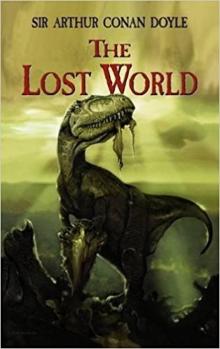 The Lost World
The Lost World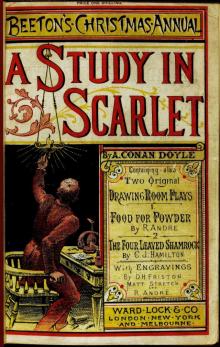 A Study in Scarlet
A Study in Scarlet The Firm of Girdlestone
The Firm of Girdlestone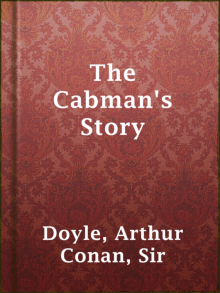 The Cabman's Story
The Cabman's Story The Adventures of Sherlock Holmes
The Adventures of Sherlock Holmes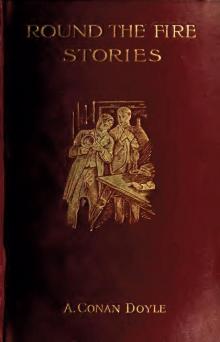 Round the Fire Stories
Round the Fire Stories His Last Bow: An Epilogue of Sherlock Holmes
His Last Bow: An Epilogue of Sherlock Holmes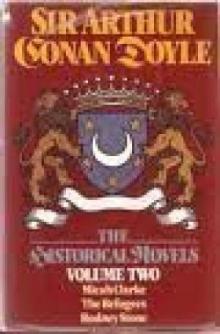 Micah Clarke
Micah Clarke The Exploits of Brigadier Gerard
The Exploits of Brigadier Gerard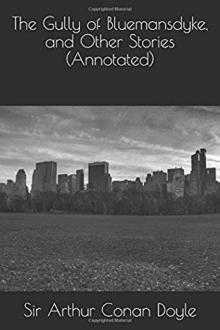 The Gully of Bluemansdyke, and Other stories
The Gully of Bluemansdyke, and Other stories The Valley of Fear
The Valley of Fear The Last of the Legions and Other Tales of Long Ago
The Last of the Legions and Other Tales of Long Ago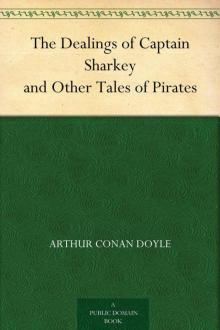 The Dealings of Captain Sharkey, and Other Tales of Pirates
The Dealings of Captain Sharkey, and Other Tales of Pirates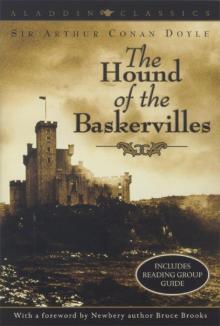 The Hound of the Baskervilles
The Hound of the Baskervilles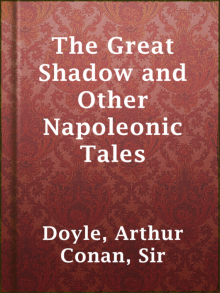 The Great Shadow and Other Napoleonic Tales
The Great Shadow and Other Napoleonic Tales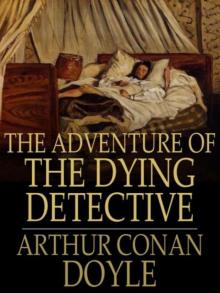 The Adventure of the Dying Detective
The Adventure of the Dying Detective The Man from Archangel, and Other Tales of Adventure
The Man from Archangel, and Other Tales of Adventure The Poison Belt
The Poison Belt The Last Galley; Impressions and Tales
The Last Galley; Impressions and Tales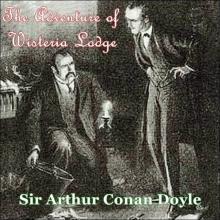 The Adventure of Wisteria Lodge
The Adventure of Wisteria Lodge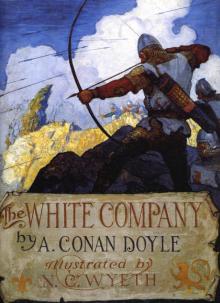 The White Company
The White Company The Mystery of Cloomber
The Mystery of Cloomber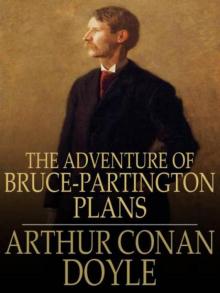 The Adventure of the Bruce-Partington Plans
The Adventure of the Bruce-Partington Plans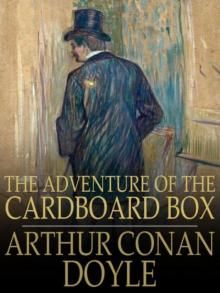 The Adventure of the Cardboard Box
The Adventure of the Cardboard Box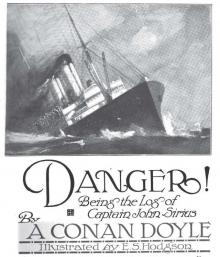 Danger! and Other Stories
Danger! and Other Stories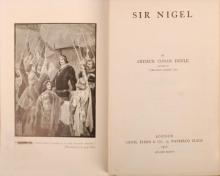 Sir Nigel
Sir Nigel The Return of Sherlock Holmes
The Return of Sherlock Holmes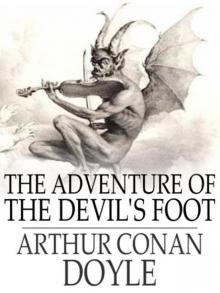 The Adventure of the Devil's Foot
The Adventure of the Devil's Foot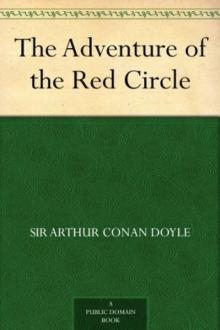 The Adventure of the Red Circle
The Adventure of the Red Circle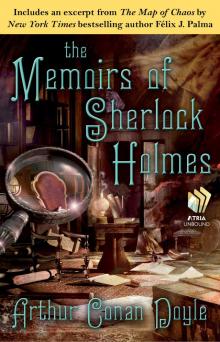 The Memoirs of Sherlock Holmes
The Memoirs of Sherlock Holmes The Adventure of the Yellow Face
The Adventure of the Yellow Face The Adventure of the Norwood Builder
The Adventure of the Norwood Builder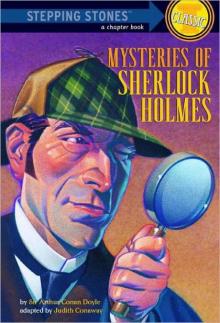 Mysteries of Sherlock Holmes
Mysteries of Sherlock Holmes The Adventure of the Missing Three-Quarter
The Adventure of the Missing Three-Quarter The Adventure of the Final Problem
The Adventure of the Final Problem A Scandal in Bohemia
A Scandal in Bohemia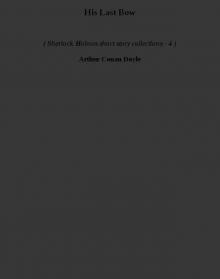 His Last Bow shssc-4
His Last Bow shssc-4 Beyond The City
Beyond The City The Adventure of the Gloria Scott
The Adventure of the Gloria Scott The Parasite
The Parasite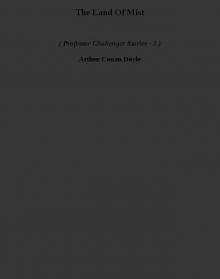 The Land Of Mist pcs-3
The Land Of Mist pcs-3 The Adventure of the Musgrave Ritual
The Adventure of the Musgrave Ritual The Complete Sherlock Holmes, Volume I (Barnes & Noble Classics Series)
The Complete Sherlock Holmes, Volume I (Barnes & Noble Classics Series) The Adventure of the Stockbroker's Clerk
The Adventure of the Stockbroker's Clerk The Adventure of the Copper Beeches
The Adventure of the Copper Beeches The New Annotated Sherlock Holmes
The New Annotated Sherlock Holmes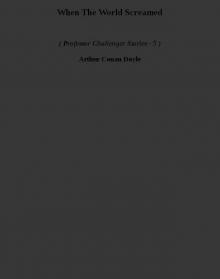 When The World Screamed pcs-5
When The World Screamed pcs-5 The Adventure of the Six Napoleons
The Adventure of the Six Napoleons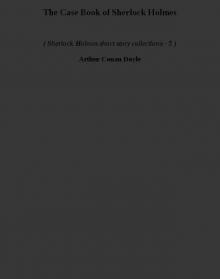 The Case Book of Sherlock Holmes shssc-5
The Case Book of Sherlock Holmes shssc-5 The Sign of Four
The Sign of Four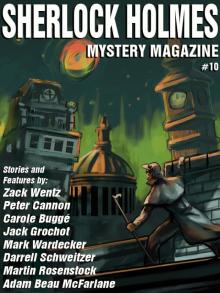 Sherlock Holmes Mystery Magazine #10
Sherlock Holmes Mystery Magazine #10 The Adventures of Brigadier Gerard
The Adventures of Brigadier Gerard The Adventure of the Second Stain
The Adventure of the Second Stain The Adventure of the Engineer's Thumb
The Adventure of the Engineer's Thumb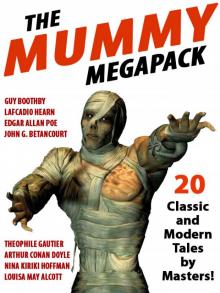 The Mummy Megapack
The Mummy Megapack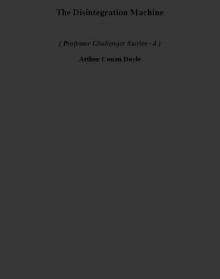 The Disintegration Machine pcs-4
The Disintegration Machine pcs-4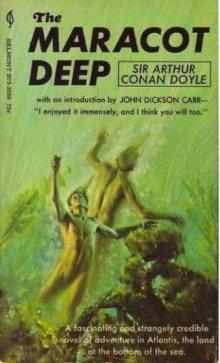 The Maracot Deep
The Maracot Deep The Five Orange Pips
The Five Orange Pips The Adventure of the Crooked Man
The Adventure of the Crooked Man The Adventure of the Blue Carbuncle
The Adventure of the Blue Carbuncle The Adventure of Silver Blaze
The Adventure of Silver Blaze The Adventure of the Solitary Cyclist
The Adventure of the Solitary Cyclist The Adventure of the Naval Treaty
The Adventure of the Naval Treaty Sherlock Holmes. The Complete Stories
Sherlock Holmes. The Complete Stories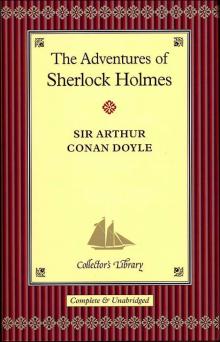 The Adventures of Sherlock Holmes (sherlock holmes)
The Adventures of Sherlock Holmes (sherlock holmes) The Adventure of the Empty House
The Adventure of the Empty House The Narrative of John Smith
The Narrative of John Smith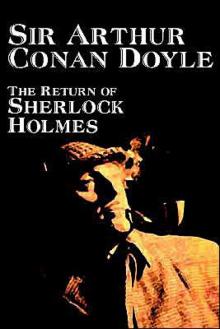 The Return of Sherlock Holmes (sherlock holmes)
The Return of Sherlock Holmes (sherlock holmes) The New Revelation
The New Revelation A Study in Scarlet (sherlock holmes)
A Study in Scarlet (sherlock holmes) The Vital Message
The Vital Message Sherlock Holmes Complete Collection
Sherlock Holmes Complete Collection Round the Red Lamp
Round the Red Lamp The Boscombe Valley Mystery
The Boscombe Valley Mystery The Adventure of the Beryl Coronet
The Adventure of the Beryl Coronet The Refugees
The Refugees The Adventure of the Three Students.
The Adventure of the Three Students.